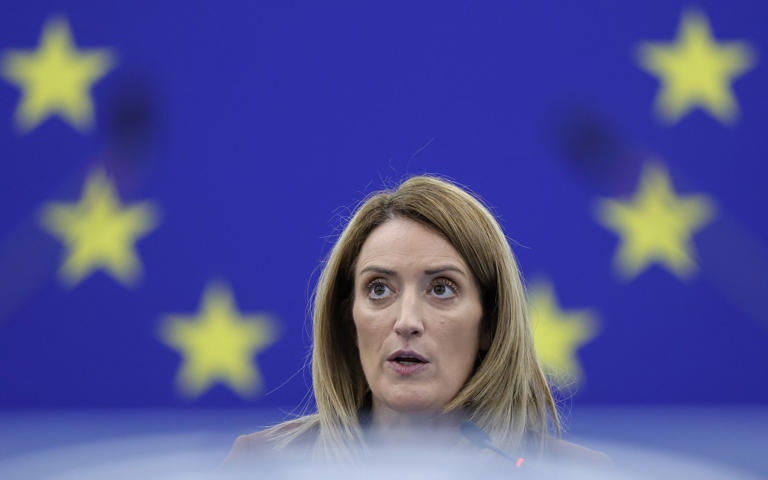
Europe's unknown presidents: Roberta Metsola of Malta's Nationalist Party in the parliament's president© Provided by The Telegraph
Afew days after the Brexit referendum in 2016, I sat watching Martin Schulz, then president of the European Parliament, lecturing British voters about the supposedly terrible decision they had just taken. I remember reflecting: “Thank goodness we won’t have to care very much longer what people like you think.”
Well, it took a bit longer than we wanted, and even now the job is not quite 100 per cent done, but we did it. Indeed, no one here is listening any longer to what the president of the European Parliament thinks. A decade ago, probably some voters at least were vaguely aware of Schulz, even if they couldn’t tell you who exactly he was. I shouldn’t think you could now find one in a thousand who would recognise the name of the current president. (It is Roberta Metsola, from Malta, by the way. There, I told you so.)
I am not writing in praise of ignorance of foreign countries. I don’t think that’s a good thing. But equally, we don’t have the same incentive as before to watch and worry about what’s going on in the EU. For it can’t do anything to us any more, at least directly.
Of course the punishment mentality has not entirely gone away, despite all the concessions our current administration has made. The EU seems to wish to make it unnecessarily difficult and complex to cross its border. Brussels seems to think it is its business that we have brought in minimum service levels for strikes, a measure that clearly does not engage our trade agreement since it does not affect trade between us. We will just have to live with this.
But because we aren’t watching so closely, it’s been possible for a fantasy version of the EU to grow up, one in which it is growing faster and managing its politics better than us. But it really isn’t like that.
Observe the EU of today. Economics first. The disaster zone of the euro is going to blow at some point. Germany, its beneficiary for so many years, is mired in recession. Business confidence ratings are comfortably positive in Britain, seriously negative in the Eurozone.
The OECD says that, in the real world not just in predictions, Britain has grown faster since we left the EU transition period than France, Germany, Italy and Poland. These are all slight variations on a generally anaemic performance by global standards. All of Europe needs to do better. But it’s not us that is holding the convoy back.
Politically, things look bad too. The far Right and Left are growing, and both wings of politics have an unpleasant edge to them that is absent here in Britain. Yes, the Tory party here may have its problems, but its French equivalent has essentially disappeared, and all the political energy is on the fringes. Its German equivalent is wilting, faced with competition from the Right-wing AfD.
In Poland, Donald Tusk is proving that there is such a thing as centrist populism with his aggressive dismantling of the political structures established by his predecessors. The Spanish prime minister has made a fragile Faustian bargain with the Catalan separatists, but it won’t hold for long, and the devil will come for him sooner than he thinks. And in the Netherlands, Geert Wilders’ populist Right movement may be the most popular party, but the Left will now pull together an unpopular coalition to keep him out.
None of this looks exactly strong and stable. And it will get worse for the mainstream the longer it refuses to face up to what large cohorts of voters actually think.
We can see one thing clearly from all this: real politics is still national in Europe. The problem is that the political structures aren’t. It’s all very well for columns of tractors to blockade parliaments, but only Brussels can change environmental rules. National leaders are supplicants, national electorates can’t kick out the European Commission, and the European Parliament is part of the problem not part of the solution.
For as long as they are in the EU, Europe’s great nation states are incomplete democracies. So it’s hardly surprising there are so many political problems. People’s concerns will find an outlet somewhere – in national parliaments if they can, on the streets if they can’t.
Does this mean the EU is going to collapse? I don’t believe so. The whole point of the EU is managed politics and it is supremely good at it. The powerful court and the vastly increased budget are the carrot and stick. One day the Commission turns the heat on Hungary and Viktor Orban backs off challenging Brussels. The next day it concedes to protesting farmers in the other direction and drops some environmental rules. Somehow the show keeps on the road.
One is reminded irresistibly of the Austro-Hungarian empire in its declining years, far less than the sum of its parts, preoccupied by its own baroque internal rules, and more of a hindrance than a help to its allies. It’s far from good that things are like this in Europe; but thank goodness we are, for now, out of the EU’s grasp.
No comments:
Post a Comment